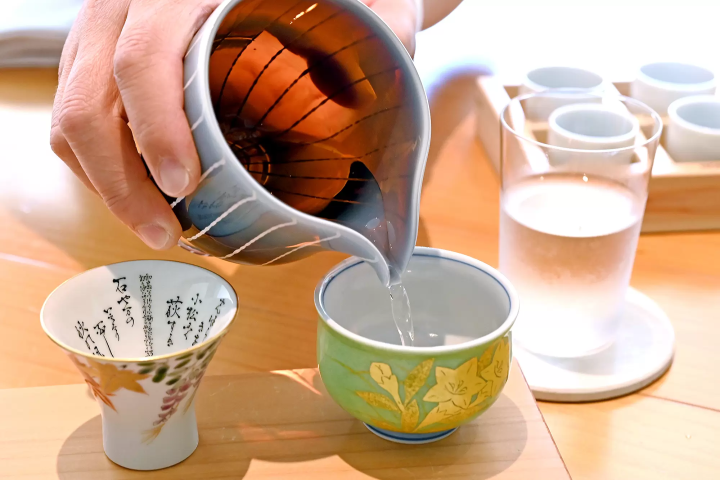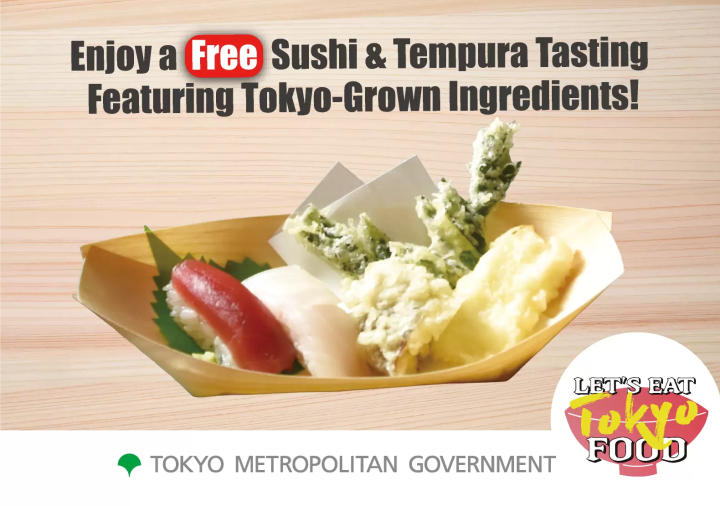Ueno Travel Guide: Explore Arts and Culture in Tokyo’s Leisure District

Ueno is one of the liveliest areas in Tokyo. It is also easily accessible from Haneda and Narita airports. Venture through museums, art galleries, the zoo, and cultural locations in this area, best known for the famous Ueno Park.
While Ueno is a charming area with museums and art galleries, there are also parks with lush nature and a zoo with pandas in the area. In addition, there are lively shopping areas and even spots where you can see traditional performing arts. With a wide range of things to do, we've compiled some recommended spots and ways to get around Ueno.
Contents:
1. Ueno Sightseeing Spots
2. Souvenirs and Shopping Spots in Ueno
3. Food, Restaurants, and Cafes in Ueno
4. Hotels in Ueno
5. Access to Ueno
6. About JR Ueno Station
7. Tourist Information Center in Ueno
8. Recommended Tourist Spots in Nearby Areas
9. Things to Know Before Heading to Tokyo
Sightseeing Destinations in Ueno
1. Ueno Zoo

This zoo is one of the most popular sightseeing spots in Ueno. The reason for its popularity is the 400 species of animals, including the Ezo Deer that are unique to Japan, and rare animals such as giant pandas. Seeing all of these animals in a single day is difficult. We recommend selecting the animals you would like to see beforehand. Then map out an itinerary to maximize your time at the zoo.
2. Ueno Park
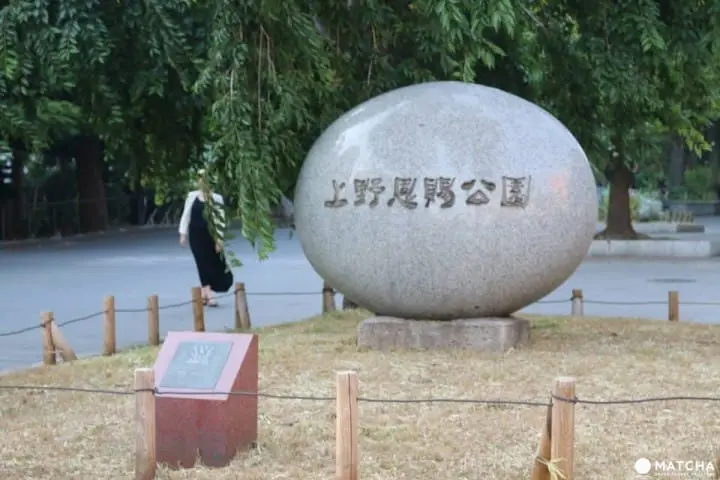
Ueno Park, nicknamed the forest of Ueno, can be enjoyed year-round. Cherry blossoms come alive in the springtime while summer welcomes lotus flowers blooming in the pond. In autumn, the area is visited by many tourists wishing to see the stunning foliage. It is about a seven-minute walk from Keisei Ueno Station and JR Ueno Station. The spacious park has a shrine, historical statues, and many more spots to explore. If you study the map in advance, you'll be able to efficiently explore the area.
For more information about Ueno Park, please read Ueno Park Guide: Ueno Zoo, Museums, Temples and Other Highlights!
3. Ameyoko Shopping Street
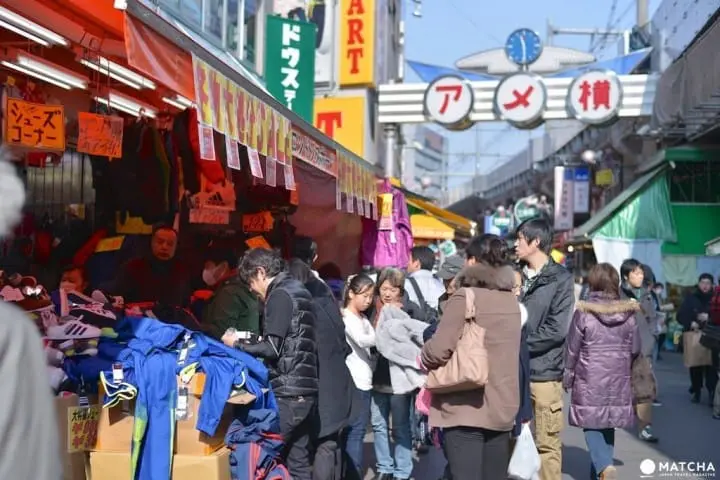
Ameya Yokocho Street, known as "Ameyoko," is a vibrant shopping street extending from JR Ueno Station to Okachimachi Station. Head to the Shinobazu Exit at JR Ueno Station. Upon exiting, cross the street to find the busy shopping area filled with food, clothes, small items, jewelry, and other great items. Depending on the store, vendors sell things using the old-fashioned way of bargaining for discounts. If you're looking for a good bargain, why not give it a try?
4. Tokyo National Museum
The oldest Japanese museum is located right in Ueno. It has a variety of important artifacts that are preserved and displayed from across Japan and other Asian countries. With a collection of over 111,000 items, the museum is separated into the main building with art from Japan. The Asia building showcases art from Asia while the Heisei building carries archaeological artifacts.
There is plenty to see at this museum! Helpful guidance is provided in English, Chinese, and Korean. There are also pamphlets in German, French, and Spanish available.
From JR Ueno Station, use the Ueno Park Exit and go past the National Museum of Western Art. You will see a large fountain in the middle of the park, where you should turn right.
5. Tokyo Metropolitan Art Museum
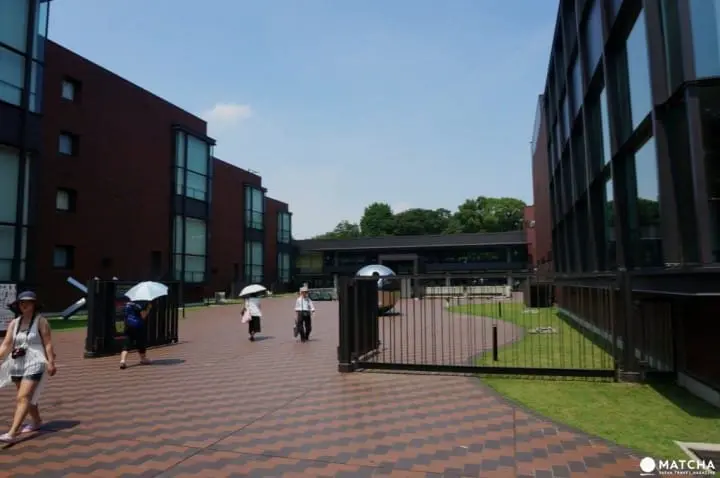
Ueno has many museums, but the Tokyo Metropolitan Art Museum can be enjoyed for free depending on the exhibit. It is also known for a hands-on event called Tobira Project that allows visitors to casually enjoy art.
6. Ueno Royal Museum
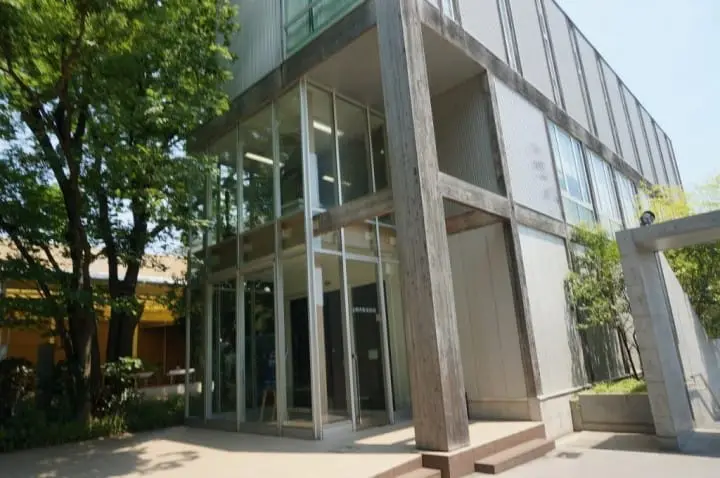
At this museum, you can check out artworks by designers and manga artists. Instead of permanent exhibitions, the museum hosts exhibitions by invited artists. There are also special exhibitions by privately owned collections from museums outside of Japan. This is a unique museum that can occasionally become crowded depending on what is on display.
7. National Museum of Western Art
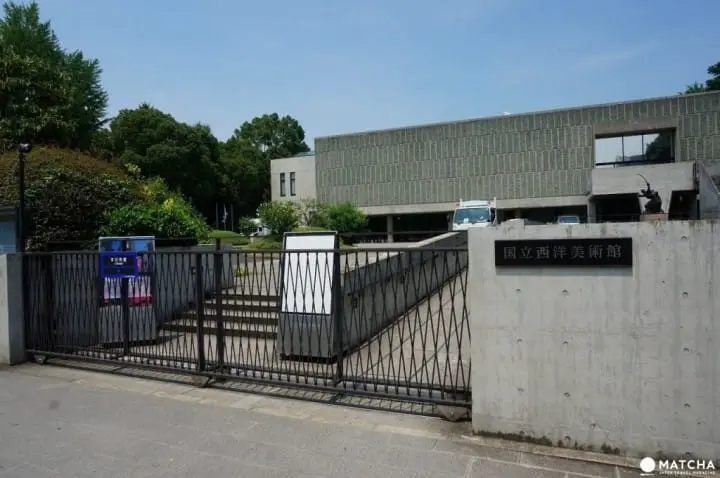
For a reasonable fee, you can see famous artworks by renowned artists such as Renoir, Monet, and Rodin. The range encompasses Western art from the Middle Ages to modern art. It is conveniently located only a minute away from the Park Exit of JR Ueno Station. Another charm is that it was designed by the famous French architect, Le Corbusier. It was even designated as a UNESCO World Heritage Site in July 2016.
8. National Museum of Nature and Science
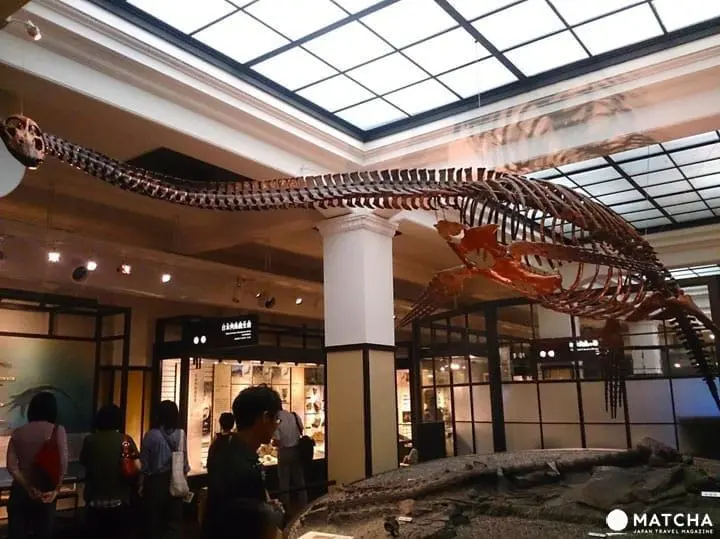
This museum is Japan's largest and only National Museum of Nature and Science operating for over 150 years. The vast collection is separated into the Global Gallery and Japan Gallery. Visitors will have fun while looking at rare artifacts in the Japan Gallery. The exhibits in the Global Gallery are themed after space, earth, ecology, biology, history of humans, technology, and of course, dinosaurs.
9. Shinobazu Pond
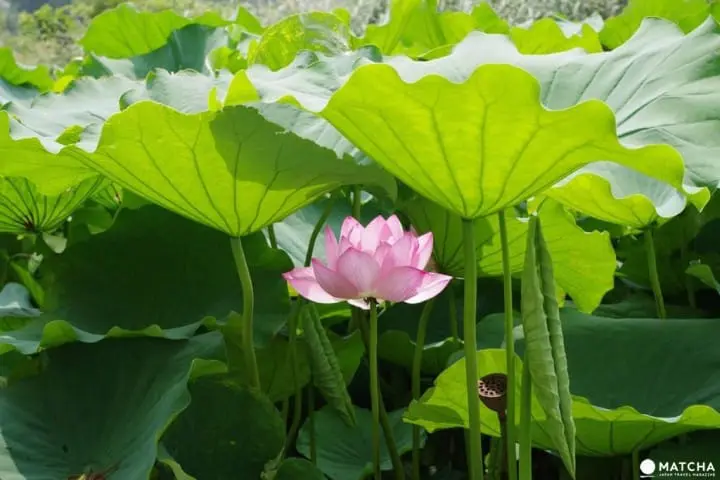
This natural pond in Ueno Park is separated into a lotus pond, a cormorant pond with many birds, and the boat pond offering rental boats. In the center of the pond, there is an island where Bentendo Temple is located. During July and August, lovely lotus blossoms are a stunning sight to see! However, the flowers only bloom from 7:00 to 9:00 and close around noon. For those interested in capturing the sight of the blossoms, waking up early is recommended.
10. Suzumoto Performing Arts Hall
The Suzumoto Performing Arts Hall is Japan's most historical Yose. "Yose" refers to establishments where you can enjoy traditional Japanese rakugo (one-man comedy performances) while eating bento boxes, snacks, and drinking beer. Please check this site (Japanese) for future rakugo performance schedules at this hall.
11. Statue of Saigo Takamori
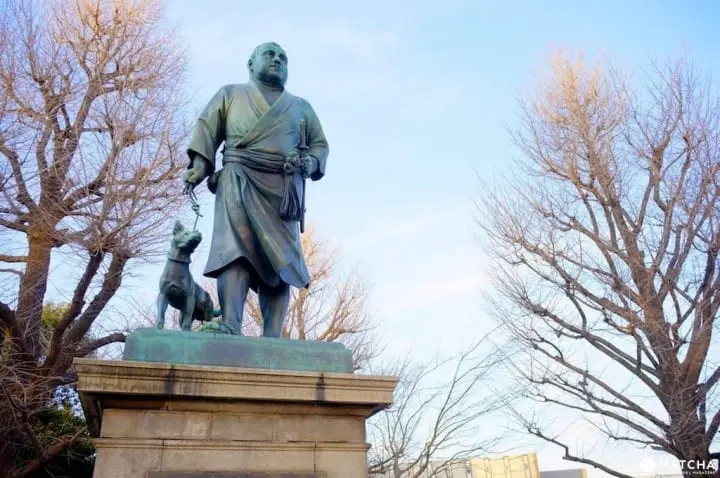
This is the statue of Takamori Saigo, who greatly contributed to the foundation of modern Japan. This is also a popular photo spot in Ueno Park.
12. Ueno Toshogu Shrine
This shrine is dedicated to Tokugawa Ieyasu, who founded the Tokugawa Shogunate at the beginning of the 17th century. It is considered to be an important cultural heritage of Japan. The torii gates, large stone lanterns, a five-story pagoda, and the main hall covered in gold are worth a visit! Cherry blossoms and peonies bloom in spring while foliage can be admired in autumn. You can also enjoy winter peonies at the start of the year.
Admission is free, but if you wish to see the shrine, Buddhist temple, and its treasures up close, an admission fee is required. During January and February, admission is required to enter the peony garden.
Other Fun Things to Do in Ueno
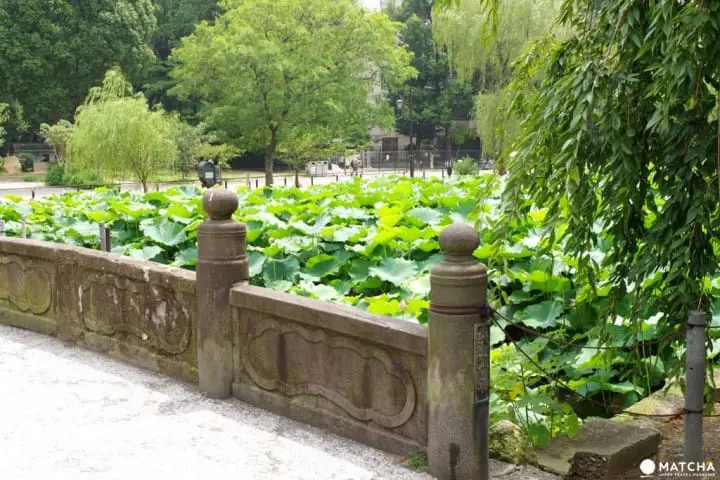
Of course, there are plenty of fun things to see and do in the Ueno area. This includes paying a visit to Bentendo Temple in Ueno Park. If you want to see another side of the metropolis, take a look at Get Off The Beaten Path: 15 Unique Things To Do In Ueno.
Souvenirs and Shopping Spots in Ueno
1. Ameyoko Shopping Street

Among a sea of fresh products, you can find nearly 400 shops standing side by side with food and goods from worldwide. Shops selling snacks, spices, clothes, shoes, watches, make-up, and more can be found here! Window shopping is also very fun.
In addition, you can find stalls with takoyaki (octopus balls), taiyaki (fish-shaped cake), seafood bowls, kebab, and many tasty dishes for a reasonable price. They make great snacks to pick up while exploring the shops. Why not try shopping here while getting a feel of traditional Japanese shopping districts? You can find great bargains and even try bargaining for discounts. Snack shops are popular and serve matcha green tea snacks, wasabi-flavored treats, and chocolate sold by weight.
2. Takeya
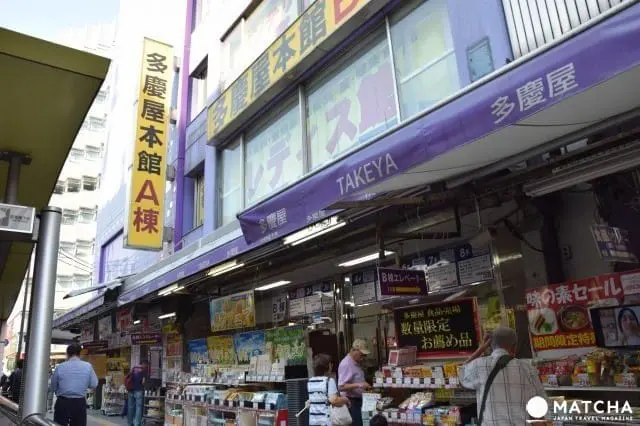
Takeya is a massive shopping mall with over 200,000 items in stock. It is separated into eight buildings, including a furniture and miscellaneous goods building. This is a great place to find souvenirs. Free Wi-Fi and tax-free products make shopping easier for overseas visitors.
3. ABAB
Carrying fashion styles for a younger generation, ABAB is a budget-friendly clothing shop with a 100-yen shop and supermarket.
4. Marui
Marui is a shopping mall to find the latest fashion and miscellaneous goods. The entire sixth, seventh, and eighth floors have a collection of clothes aimed at business and sports for men. Along with a wide selection of clothes, you'll find popular shops such as MUJI and Francfranc to buy stylish interior goods.
5. Atre Ueno Building
The Atre Ueno building is separated into the east and west side. We recommend the west side for shopping. In particular, the first floor is filled with fashion brands for female customers. Atre is connected to JR Ueno Station while the west side is right outside Shinobazu Exit.
Read also
Food, Restaurants, and Cafes in Ueno
Tasting local food is a must-do activity when traveling. There are many places to eat from historical restaurants to fancy cafes in Ueno. Below are some dining places recommended for lunch, dinner, and afternoon tea.
7 Recommended Restaurants in Ueno
Tonkatsu Yamabe
In recent years, tonkatsu (breaded pork cutlet) has gained popularity outside of Japan. At Yamabe, you can savor a pork loin cutlet meal for 700 yen. The thick, juicy piece of pork is delicious when eaten hot. Rice, miso soup, cabbage, and pickles are also included in the set.
Motsuyaki Daitoryo
This is a popular restaurant where you can savor delicious grilled offal and offal stew. The first floor is spacious while the second floor has a relaxing Japanese-style room. It is frequently packed with guests enjoying beer and sake from noon to night.
Magurobito
Magurobito is a standing sushi shop where people can eat sushi casually for a reasonable price. Most people get full at around 3000 yen worth of sushi. It is a popular restaurant, and at times you may find lines or certain dishes sold out. It is advised to head here early.
Yoshokuya Sandaime Taimeiken
This is a Western-style restaurant located inside Ueno Station. This famous restaurant is known among many Japanese people. The omurice (rice omelet) is the top recommended dish. This fluffy egg omelet with ketchup-flavored rice topped with demi-glace sauce makes up this decadent dish.
Ramen Tenjinshita Daiki
When one thinks of ramen in Ueno, this store will likely spring to mind! With a light soup base and thin noodles, this delicately flavored ramen is loved by many.
Ebi Ginjo Zipang
Another ramen shop in Ueno is Zipang. Unlike the shop mentioned above, the soup here has a bold, rich flavor of shrimp. Made without any lard or artificial flavoring, the special blend of natural ingredients is the reason for its popularity.
Delhi
In addition to all the Japanese food, you can find different world cuisines in Ueno. Delhi is an Indian and Pakistani restaurant specializing in curry. For those who like spicy food, the Kashmiri curry is highly recommended. There are plenty of fans who have been coming here for their curry fix for years.
5 Recommended Cafes
PARK SIDE CAFE
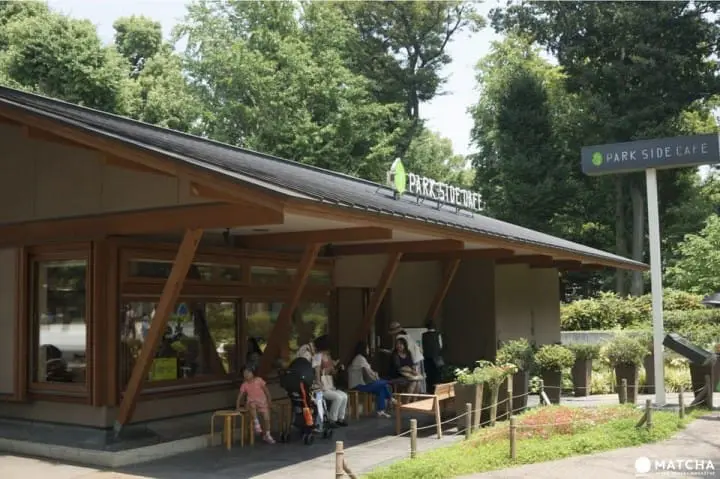
This lovely cafe is inside Ueno Park. On a sunny day, you can spend a relaxing time in the terrace seats outdoors.
Oka
Time passes slowly in this retro cafe. If you would like to experience a classic Japanese cafe, we highly recommend coming here. The Napolitan ketchup pasta is absolutely delicious!
Mihashi
For those looking for something other than cake and coffee, this store serves traditional Japanese sweets such as anmitsu (*1) and zenzai with a red bean soup. This cafe also has a relaxing atmosphere.
*1 Anmitsu: A traditional Japanese dessert with anko red bean paste and beans, drizzled with molasses in a bowl.
WIRED CAFE
A fancy cafe inside Atre Ueno with a stylish interior and menu. It is an ideal spot to take a break or have a meal after shopping.
Cafe Lapin
This retro cafe is tucked away in an alley in Tokyo. It is a great spot to enjoy a sandwich and savor a relaxing moment.
Hotels in Ueno
Now, we will introduce some recommended hotels in Ueno sorted by price range.
Budget-Friendly Hotels
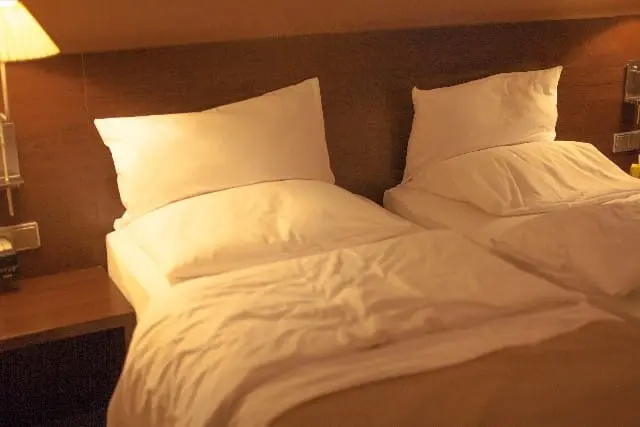
Photo for reference purposes only.
Tokyo Ueno Youth Hostel
This hostel was formally a business hotel that has since been renovated. All rooms have a private bathing space and toilet. Although it is not a dormitory, you must share it with three or more people. Within walking distance are train stations to conveniently catch multiple lines. Located only ten minutes on foot from Keisei Ueno Station, it is great for accessing Narita Airport and other popular spots such as Ueno Park, Akihabara, Ameyoko, which are a three to five-minute walk away.
Prices are 3,500 yen on weekdays and 3,900 yen on weekends and holidays.
Address: Tokyo, Taito, Ueno 1-13-6 Niigatakenjin Kaikan 4th Floor
Website: Tokyo Ueno Youth Hostel
Ueno Touganeya Hotel
Offering a variety of accommodation plans, a one-night stay starts at 3,300 yen per night. There are business plans (from four days and more) that are useful when staying for an extended period of time.
Hotel Mystays Ueno Iriyaguchi
Conveniently located five minutes by foot from JR Ueno Station, this hotel has many rooms with different plans. The most cost-friendly plan starts at 2,610 yen for a smoking standard double room for two. For groups of three, there is a deluxe triple room starting at 2,520 yen per person.
All rooms come with a mini kitchen. You can even rent out pans and rice cookers for free. Those on a budget or not in the mood to eat out may find this a handy option. Wi-Fi is also available.
Standard Grade Hotels
Hotel Sunroute Stella Ueno
The popular Sunroute Hotel brand also has a location only two minutes from Ueno Station.
With many types of rooms, you can select among the standard single, modern Japanese single, deluxe single, and stack single according to your needs. Prices start at around 5,500 yen per person. There's even a breakfast serving Japanese-Western style cuisine for 1,300 yen.
Villa Fontaine Ueno
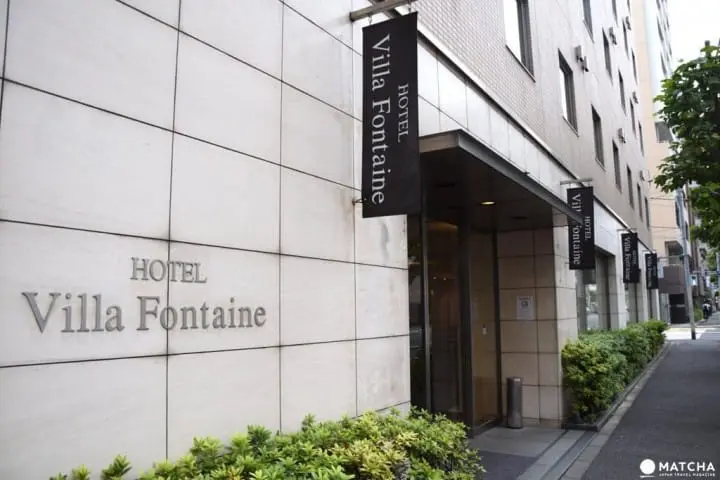
For simple and chic rooms with slightly more space and a larger bed, Villa Fontaine Ueno fits the bill. It also has a free breakfast buffet with bread, salad, soup, scrambled eggs, and dishes to kick start your morning. Prices start from 3,796 yen per person.
Luxury Hotels
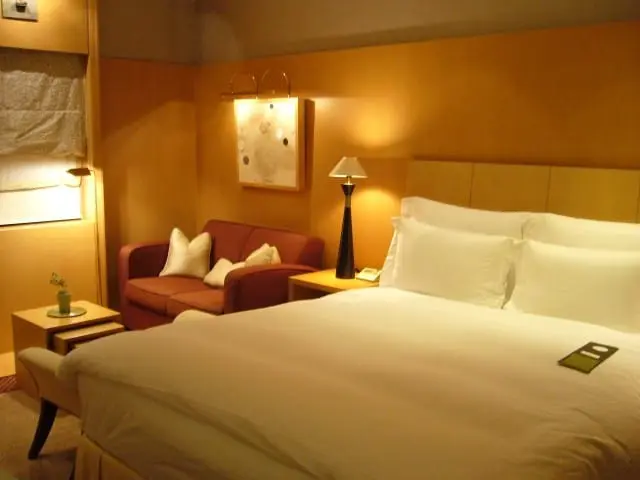
Photo for reference purposes only.
Hotel New Tohoku
Only two minutes from Tokyo Metro Ueno Station, this hotel has single, double, and twin rooms with single rooms starting at 6,200 yen per person. Each room has large beds, a bathroom, flat-screen TV, refrigerator, assorted amenities, and Wi-Fi.
Amenities can be rented for free along with complimentary newspapers and coffee service in the morning. Restaurants and convenience stores are also located nearby. However, there is no elevator, so this spot is recommended for those with small luggage or not requiring additional assistance.
Hotel Dormy Inn Ueno/ Okachimachi
Dormy Inn is a hotel franchise that is located only a minute away from Ameyoko. This hotel chain is known for its large shared bath on the top floor.
The rooms are equipped with beds by the American brand Serta. The white and brown interior gives the room a classic and relaxing ambiance. All of the buildings have Wi-Fi and prices start at 6,900 yen per person/night.
Access to Ueno
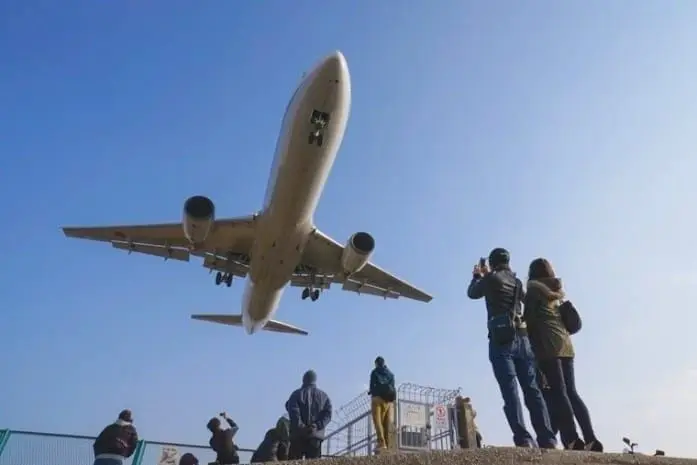
Narita International Airport in the Kanto region and Kansai International Airport in Osaka are both gateways for flights outside Japan. Below, we'll introduce the best routes for accessing Ueno Station along with each ride duration and cost.
The following passes and tickets are both convenient and cost efficient when traveling around Ueno and the rest of Tokyo: Tokyo Subway Ticket (24, 48, and 72-hour passes available), Japan Rail Pass, Suica IC Card Reservation
Access from Narita Airport
From Narita Airport, there are two convenient non-stop routes to access Ueno.
Fastest Way: Keisei Electric Railway Skyliner
From Narita Airport Station, ride the Keisei Electric Railway's Skyliner to arrive at Keisei Ueno Station.
Travel Time: 41 minutes
Train Fare: The Liner ticket is 2,570 yen for a one-way adult ticket. All seats are reserved, so if you plan on boarding, you will need both the Liner ticket and boarding ticket to get on.
Stations: Narita Airport Station at Terminal 1, Narita Airport Terminal 2, 3 Station for terminals 2 or 3
Budget Friendly Way: Keisei Main Line Limited Express Rapid or Limited Express
From Narita Airport Station, take the Keisei Electric Railway's Keisei Main Line to Keisei Ueno Station.
Travel Time: Around 70 minutes
Train Fare: 2,570 yen for Adults (One-Way Ticket)
Stations: Narita Airport Station at Terminal 1, Narita Airport Terminal 2, 3 Station for terminals 2 or 3
Note: Local people use this line for work and school. Plan carefully so you do not get on this train during rush hours on weekdays.
Read also
Access from Osaka (Kansai International Airport)
This time, we will introduce ways to arrive at Ueno with the least amount of transfers.
From Kansai International Airport, ride the Limited Express Haruka to Shin-Osaka Station. From there, transfer to the Nozomi bullet train to Tokyo Station. Then transfer to the JR Keihin Tohoku Line, Negishi Line, Yamanote Line, Tokaido Main Line, or Ueno-Tokyo Line to arrive at Ueno Station.
If you travel from Kansai International Airport to Ueno Station via the route mentioned above, the total price including non-reserved seats on the bullet train and limited express Haruka will be 15,180 yen (reserved seat costs 16,270 yen). The ride will take approximately four hours.
Notes and Other Useful Information
Please note that JR Ueno Station and Keisei Ueno Station are different stations despite both having trains heading to Narita Airport. They are approximately eight minutes away from each other by foot. Also, if you arrive in Osaka, going on a low-cost carrier (LCC) flight to Narita Airport is a convenient option. Starting at around 25,000 yen, it takes approximately two and a half hours to three hours.
About JR Ueno Station
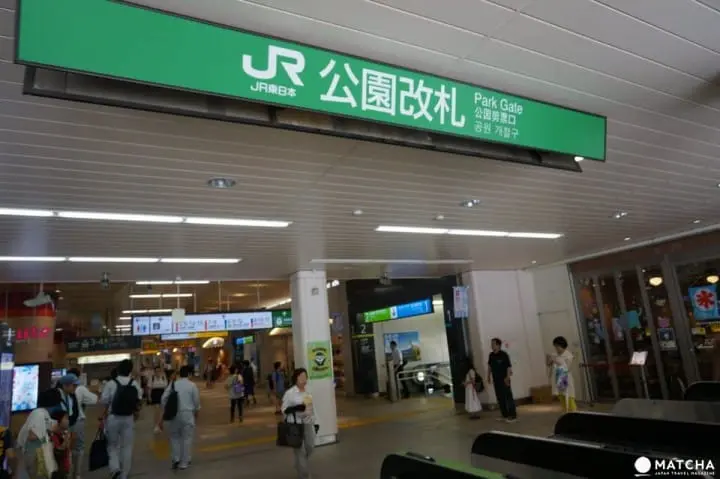
Pick the Exit According to Your Destination
JR Ueno Station is where many bullet trains stop, making it one of the most important stations in Tokyo. It also explains why the massive station has many entrances and exits. If you don't use the correct exit, you may be making a bigger detour than imagined. Let us explain which exit leads to the major tourist sites in Ueno.
The entrances to Ueno Station are located on the first and third floors.
First Floor
1. Shinonbazu Ticket Gate
Yamashita Exit
Shinobazu Exit: Ameyoko, Keisei Ueno Station, close to Ueno Station on the Hibiya or Ginza Lines.
Hirokoji Exit: Marui, close to Yamashiroya
2. Central Ticket Gate
Main Entrance Exit
Asakusa Exit
Third Floor
3. Park Gate
Park Exit (Koen-guchi): Ueno Park, close to Ueno Zoo
4. Iriya Gate
Panda Bridge Exit
East Ueno Exit
Iriya Exit
For those looking to explore around Ueno, we recommend using the Shinobazu Exit, Hirokoji Exit, or Park Exit. Depending on your destination, you can either head to the first floor for the Shinobazu Gate or the third floor for the Park Gate.
Read also
Main Trains Lines that Stop at Ueno Station
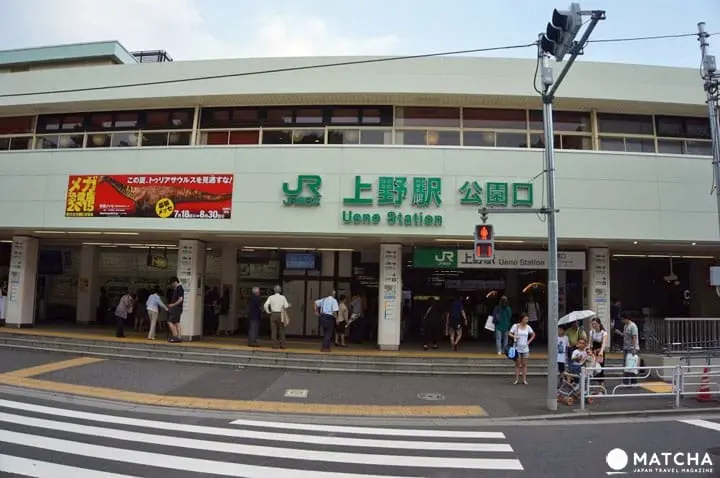
At Ueno station, there are many train lines that can be used depending on where you are going.
Regular Lines
JR Keihin Tohoku Line: Bound for Yokohama or Omiya
JR Yamanote Line: Bound for Tokyo / Shinagawa (outer loop), bound for Ikebukuro / Shinjuku (inner loop)
JR Ueno Tokyo Line: Bound for Tokyo
JR Tohoku Main Line: Utsunomiya Line: Bound for Utsunomiya
JR Joban Line: Bound for Sendai
JR Joban Line Rapid: Bound for Toride
JR Takasaki Line: Bound for Takasaki
Bullet Trains
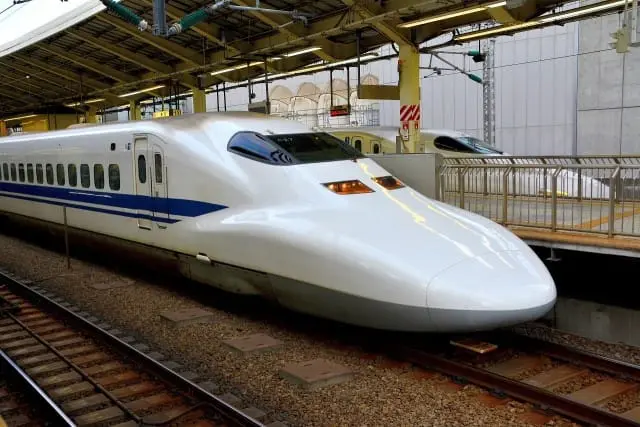
JR Tohoku / Hokkaido bullet train bound for Shin-Hakodate-Hokuto Station
From Ueno Station, it takes approximately 90 minutes to Fukushima, two hours to Sendai, three hours and 15 minutes to Morioka, and four and a half hours to Shin-Hakodate-Hokuto.
JR Hokuriku bullet train bound for Kanazawa Station
From Ueno Station, it takes approximately one hour and 50 minutes to Nagano, two hours and ten minutes to Toyama, two and a half hours to Kanazawa.
JR Joetsu bullet train bound for Niigata Station
From Ueno Station, it takes approximately one hour and ten minutes to Echigo Yuzawa and two hours to Niigata.
The Japan Rail Pass that allows international visitors to freely ride JR lines is very convenient when riding the lines mentioned above.
Along with the JR Lines, there are additional train lines you can board from Ueno Station.
Tokyo Metro (Subway) Ginza Line Ueno Station
This line is convenient to go to Asakusa and Ginza. Look for the orange mark to get on this line.
Tokyo Metro (Subway) Hibiya Line Ueno Station
This line is convenient to go to Akihabara, Tsukiji, Ginza, and Roppongi. Look for the silver mark to get on this line.
You can board the two Tokyo Metro Lines mentioned above in the basement of the JR Ueno Station.
Keisei Line Ueno Station
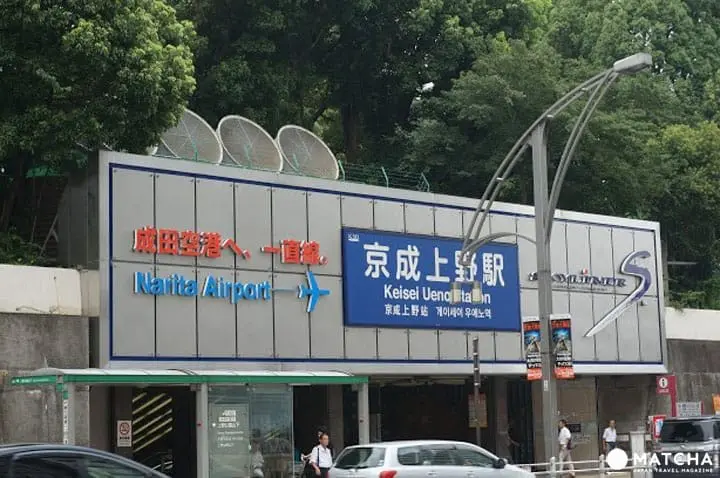
This line is convenient when heading to Narita Airport.
Toei Oedo Line Ueno Okachimachi Station
This line is connected to Nishi-Shinjuku Station.
Tourist Information Center in Ueno
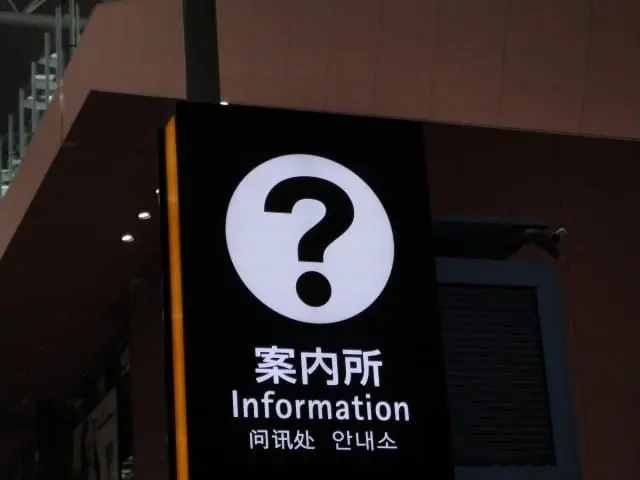
If you are lost, confused, or have a particular place you want to visit while in Japan, we recommend inquiring at the tourist information center.
Tokyo Tourist Information Center, Keisei Ueno
After exiting the gates of Keisei Ueno Station, you will quickly spot the information center with multilingual support. Staff can assist you with tourist routes and recommend accommodations, museums, galleries, and events. In addition to helpful transportation tips, you can even arrange a car rental service. They will provide you with basic travel information complete with money exchange services. It is a great place to discuss your journey to make traveling around the area easier. Look for the ninja that is on the building's exterior.
Gurunavi Information Lounge Ueno
Outside the Asakusa Exit at JR Ueno Station, an information center that specializes in restaurant recommendations is located. Local staff members familiar with the area will assist in finding a restaurant in Ueno and Asakusa according to the number of guests, occasion, and what you want to eat. You can even specify places according to your needs, such as an eatery with various Japanese sake or offer a vegetarian menu. Many tourists with limited time stop by to get the most out of their stay. Free Wi-Fi is also available.
Recommended Tourist Spots in Nearby Areas
Many famous and fun tourist spots are located near Ueno. Why not extend your adventure by exploring the surrounding areas?
Asakusa
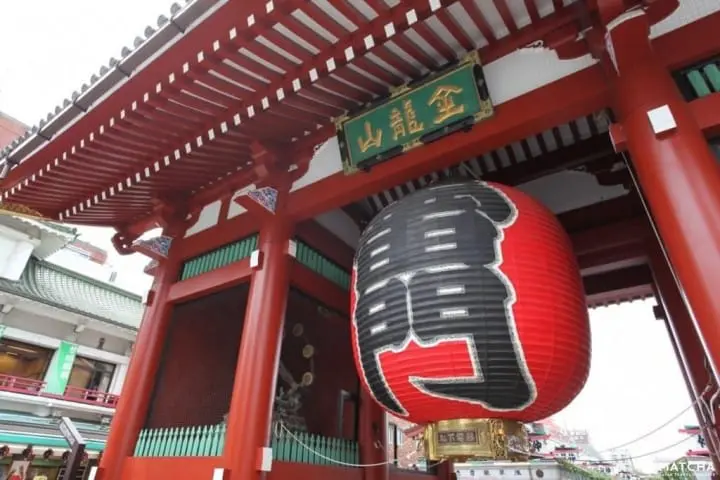
Asakusa is a well-known tourist site located in the heart of Tokyo. You can see a mix of history and tradition at Sensoji Temple and Nakamise-dori shopping area along with modern buildings like the Tokyo Skytree. Then try some local favorites such as soba noodles and dojo loach during your visit.
Akihabara
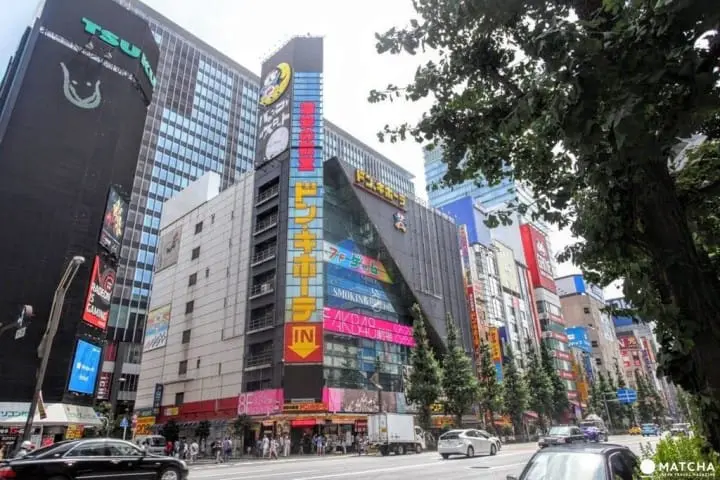
An area for hobbyists filled with electronics and shops specializing in subcultures. It is a wonderful place to purchase electronics for a low cost, otaku merchandise, and souvenirs. For those wishing to indulge in the world of their fandom, you may even find thematic cafes and shops in this area.
Yanesen
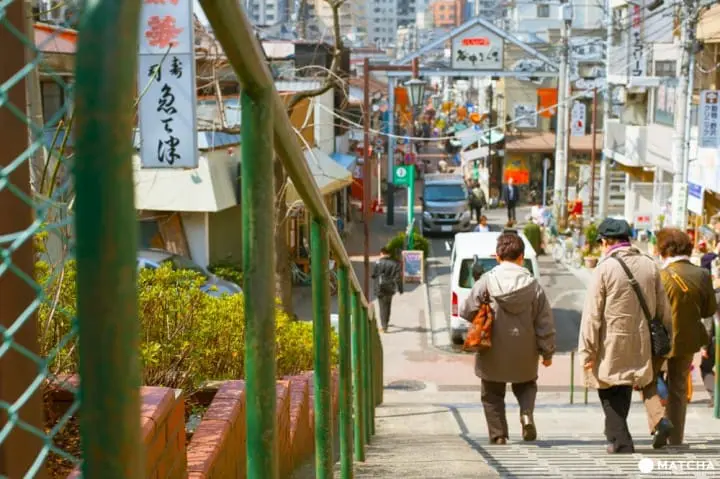
The area between Yanaka, Nezu, and Sendagi is often referred to as "Yanesen." It is a quaint area where you can slip back in time and get a feel of retro Tokyo. You'll find plenty of charming traditional buildings in the area.
Kappabashi Dougu Street
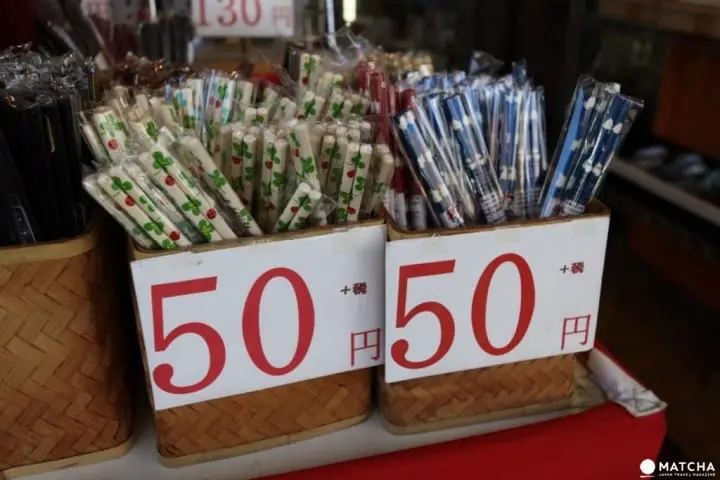
A shopping street extending approximately 800 meters filled with shops carrying cooking tools used by professional chefs. It is the perfect place to pick up souvenirs for people who enjoy cooking. You can also find many stores that either sell or provide workshops to make food samples.
Things to Know Before Heading to Tokyo
If you happen to encounter basic issues in Ueno, please read this article.
What should you wear during different seasons in Tokyo?
How much does food cost in Japan? Let's set a budget before leaving.
Do you need to exchange foreign currency?
If you run out of cash, find an ATM with a "PLUS" mark. You will be able to easily use a foreign cashing service.
Knowing some simple Japanese phrases while staying at hotels can come in handy. Here are a few you can use:
In Japan, there are useful Wi-Fi services such as the "Japan Connected-Free Wi-Fi." It is recommended to download the app on your phone prior to coming to Japan.
旅行が趣味の22歳です。日本の魅力をお届けします。






















































![[Shinjuku Nishiguchi HALC] About the d Point Campaign](https://resources.matcha-jp.com/resize/720x2000/2026/02/14-258714.webp)
